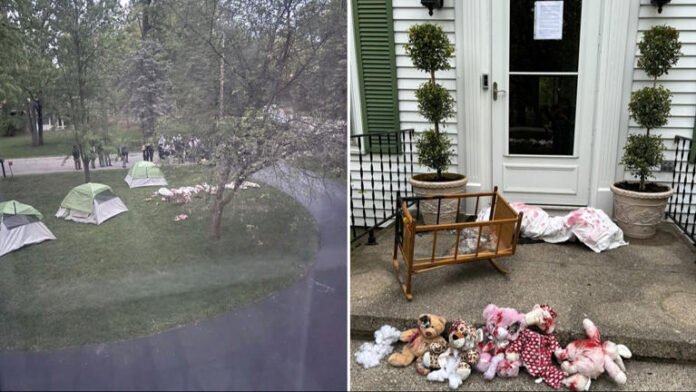Protesters advocating for Palestinian rights placed fake corpses outside the residence of a high-ranking official associated with a prominent US university. The symbolic demonstration aimed to draw attention to the ongoing humanitarian crisis in Gaza and to protest against what the demonstrators perceive as complicity or indifference on the part of academic institutions towards the plight of Palestinians.
The protest, which took place in a residential neighborhood, shocked local residents and sparked widespread debate about the ethics and effectiveness of such confrontational tactics. While some condemned the demonstration as excessive and inappropriate, others expressed solidarity with the protesters’ cause and defended their right to engage in peaceful protest.
The decision to place fake corpses outside the home of a university official was a deliberate and provocative act intended to shock and disrupt. By using visual imagery reminiscent of the devastating toll of conflict and violence in Gaza, the protesters sought to convey the urgency and severity of the situation facing Palestinians. The symbolic gesture underscored the protesters’ frustration with what they perceive as inadequate action or support from institutions that they believe should be speaking out against injustice.
The demonstration also highlighted the growing pressure on academic institutions to address issues of social justice and human rights, particularly in the context of the Israeli-Palestinian conflict. Critics argue that universities have a moral obligation to condemn human rights violations and to use their influence to advocate for peace and justice. They accuse some institutions of prioritizing political considerations or financial interests over ethical principles, thereby perpetuating injustice and inequality.
In response to the protest, the university official targeted by the demonstration issued a statement expressing sympathy for the plight of Palestinians while condemning the tactics employed by the protesters. The official emphasized the importance of constructive dialogue and peaceful protest in advancing social change, urging demonstrators to engage in respectful and productive forms of activism.
The incident has reignited debates about the limits of protest and the role of academic institutions in addressing global conflicts and humanitarian crises. While some argue that provocative actions like the one witnessed in this demonstration are necessary to draw attention to pressing issues, others caution against the potential for such tactics to backfire or alienate potential allies.
Moving forward, the protest is likely to galvanize further discussion and activism around the Israeli-Palestinian conflict and broader issues of social justice. It serves as a reminder of the power of grassroots movements to challenge established narratives and demand accountability from those in positions of power.
As the situation in Gaza continues to deteriorate and the plight of Palestinians remains unresolved, protests and demonstrations are likely to intensify, both on university campuses and in communities around the world. Whether through symbolic gestures or sustained activism, individuals and groups committed to advocating for Palestinian rights will continue to push for change and hold institutions accountable for their actions.
The placement of fake corpses outside the home of a university official has sparked a broader conversation about the responsibility of academic institutions in addressing global humanitarian crises. Critics argue that universities, as centers of knowledge and social influence, have a moral imperative to speak out against injustice and support marginalized communities. They contend that by remaining silent or passive in the face of atrocities like those occurring in Gaza, academic institutions risk complicity in perpetuating human rights violations.
Conversely, some observers caution against the potential for protests like this one to escalate tensions and hinder productive dialogue. While acknowledging the importance of raising awareness and holding institutions accountable, they emphasize the need for constructive engagement and respectful discourse. They argue that actions perceived as confrontational or aggressive may alienate potential allies and detract from the broader goals of advocacy and social change.

